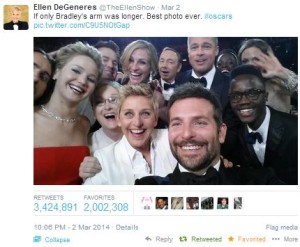Unless you live under a rock, there is no doubt that you have seen the “selfie” that comedian Ellen Degeneres posted on Twitter while she was hosting the Academy Awards on Sunday, March 2nd. While I was watching the Oscars, I saw the scene unfold: In the middle of the ceremony, Degeneres suddenly descended from the stage and declared that she was on a quest to snap the most retweeted picture of all time. She kept beckoning for other celebrities, such as Brad Pitt and Angelina Jolie, to join in. This culminated in a star-studded picture that garnered over 3.4 million retweets, satisfying her goal of making it the most retweeted Tweet of all time. It also smashed the record held previously by President Obama when he won the most recent Presidential election. Deemed by the Los Angeles Times as the “Tweet that broke Twitter” and “the greatest Selfie of all Time” by MTV, The selfie even earned over $3 million for charities. Personally, before this legendary selfie, I had never even seen a Tweet make it to one million retweets, let alone 3.4 million!
The memorable selfie has been duplicated by celebrities as well as the general public. One of the most notable reproductions of the famed photo was tweeted by comedian Jimmy Kimmel about two weeks later. The caption? “@TheEllenShow– No Brad Cooper but 3 Clintons & a Kimmel.” Although Kimmel’s attempt did not receive half as many retweets as Degeneres’, it illustrates the social trend that Degeneres created. The fact that the selfie triggered a myriad of responses from Kimmel, along with others such as 50 cent, the creators of The Simpsons, and a few ambitious people on my Instagram feed.
So, what does the staggering popularity of Degeneres’ selfie say about ourselves as a society? The fact that the selfie amassed so much attention, ranging from leading news stations to the common everyday Tweeter, just goes to show how much of an impact social media sites such as Twitter, Facebook and Instagram have had on our lives. People’s feelings about the selfie range from near addiction to pure hatred–an Inuit campaign called “SEALFIE” has been instituted as a protest against Degeneres, who used the selfie to donate money to an anti-seal hunting fund. Personally, I believe that humorous moments such as these can be a healthy reprieve from the stresses of everyday life–that’s why I think they get so much attention. One could argue that social media is a detrimental force on society and that its prominence is an example of how future generations are getting “doomed,” but that’s no fun at all. The negative backlash that this selfie has provoked strikes me as an overreaction to a lighthearted, humorous matter.
In addition, the popularity of the selfie expresses the profound impact that A-list celebrities such as Jennifer Lawrence, Meryl Streep and Bradley Cooper can have on the community. In addition, the fact that the selfie has more retweets than those featuring the Clintons and Obama does not necessarily mean that society cares more about celebrities. It simply illustrates that when browsing social media sites, people tend to look for more playful and humorous matters, unlike politics, which can be daunting. The remarkable popularity of Degeneres’ selfie is a representation of the endless possibilities that can be reached via social media.

